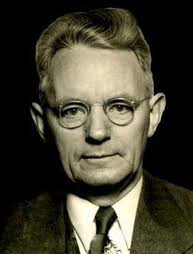Antitheses in Education
The principles by which believers live are squarely opposed to the principles by which unbelievers live. This is true in the field of education as well as in the church. Accordingly we speak of antitheses in education. These antitheses cover the whole educational field. They cover first the field of educational philosophy. This is of basic significance, but is often overlooked. In the second place these antitheses appear in the field of what is to be taught, i.e., the curriculum. Finally these antitheses appear when we consider the child or the young person to be instructed. Under these three aspects we shall try to bring out the antitheses in educational philosophy.
Non-Christians believe that the universe has created God. They have a finite god. Christians believe that God has created the universe. They have a finite universe. Non-Christians therefore are not concerned with bringing the child face to face with God. They want to bring the child face to face with the universe. Non-Christian education is Godless education. What is of most importance to us in education, that which is absolutely indispensable to us, is left out entirely.
Godless education ignores or denies that man was created responsible to God. This implies that sin is not a transgression of God’s law. Hence Christ did not need to die in our stead. Godless or non-theistic education is therefore also non- or anti-Christian education. Godless, non-Christian education naturally becomes humanistic, i.e., man-centered. If man does not need to live for God, he may live for himself If then we want a God-centered and truly Christian education, we will have to break away completely from the educational philosophy that surrounds us.
Non-Christians believe that man is surrounded by an absolutely unknowable universe. Man is grasping in the dark, except for the little light that his own mind is radiating as a headlight in the mist. Christians believe that originally man lived in the light of the revelation of God and that in Christ as the fact-revelation and in Scripture as the Word-revelation, man is in principle restored to that true light of God.
Accordingly non-Christian education dashes first this way and then that under the delusion that it has pierced the darkness, or it stops altogether in utter despair. Often non-Christian educators do away with the idea of a definite aim or purpose in education altogether. They talk of “functional adjustment” to one’s environment. But if man does not know the road and drives in the mist, why should he “step on the gas”? As Christians we know the purpose of education. We also know what should be the content of education. Finally we know that a definitely Christian method is to be used in the instruction of a definitely Christian content.
Non-Christians believe that insofar as man knows anything, he knows apart from God. Man’s mind is not an electric bulb that needs a current if it is to show any light, but it is rather an oil lamp that carries its own supplies. Christians believe that everything is dark unless the current of God’s revelation be turned on. We cannot even see any “facts” without this light. Non-Christian teachers will accordingly sometimes think they really have and know the “facts” and can teach the child all about them, and then again when they see that the “facts” are really in the dark they will give up in utter despair. Christian teachers know that not a single “fact” can really be known and therefore really be taught unless placed under the light of the revelation of God. Even the laws of arithmetic cannot be known otherwise.
We need to become more conscious of these basic distinctions. Unless we are conscious of them, we shall never have genuinely Christian schools. To be conscious of these distinctions does not mean that we must spend much more time on the direct teaching of religion than on teaching other matters. If we teach religion indirectly, everywhere and always, we may need less time to teach religion directly. To be conscious of these distinctions does mean that the plan of curriculum is to be God-centered. Man exists for God. But in the created universe other things exist for man. Hence in this sense the curriculum must be man-centered. Only thus can it become God-centered.
Non-Christians believe that the personality of the child can develop best if it is not placed face to face with God. Christians believe that the child’s personality cannot develop at all unless it is placed face to face with God. Non-Christian education puts the child in a vacuum. In this vacuum the child is expected to grow. The result is that the child dies. Christian education alone really nurtures personality because it alone gives the child air and food.
Non-Christians believe that authority hurts the growth of the child. Christians believe that without authority a child cannot live at all.
Non-Christians do speak of the authority of the “expert,” but that is not really authority. Christians want authority that is based upon the idea of God as man’s Creator and of Christ as man’s Redeemer.
Thus we see that the antithesis touches every phase of education. To try to enforce the idea of the antithesis at one point and to ignore it at others is to waste your energy and your money. We cannot afford this.

Cornelius Van Til and Eric H. Sigward, Unpublished Manuscripts of Cornelius Van Til, Electronic ed. (Labels Army Company: New York, 1997).

